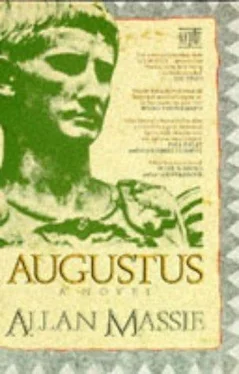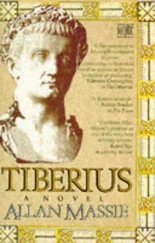Allan Massie - Augustus
Здесь есть возможность читать онлайн «Allan Massie - Augustus» весь текст электронной книги совершенно бесплатно (целиком полную версию без сокращений). В некоторых случаях можно слушать аудио, скачать через торрент в формате fb2 и присутствует краткое содержание. Жанр: Исторические приключения, на английском языке. Описание произведения, (предисловие) а так же отзывы посетителей доступны на портале библиотеки ЛибКат.
- Название:Augustus
- Автор:
- Жанр:
- Год:неизвестен
- ISBN:нет данных
- Рейтинг книги:4 / 5. Голосов: 1
-
Избранное:Добавить в избранное
- Отзывы:
-
Ваша оценка:
- 80
- 1
- 2
- 3
- 4
- 5
Augustus: краткое содержание, описание и аннотация
Предлагаем к чтению аннотацию, описание, краткое содержание или предисловие (зависит от того, что написал сам автор книги «Augustus»). Если вы не нашли необходимую информацию о книге — напишите в комментариях, мы постараемся отыскать её.
Augustus — читать онлайн бесплатно полную книгу (весь текст) целиком
Ниже представлен текст книги, разбитый по страницам. Система сохранения места последней прочитанной страницы, позволяет с удобством читать онлайн бесплатно книгу «Augustus», без необходимости каждый раз заново искать на чём Вы остановились. Поставьте закладку, и сможете в любой момент перейти на страницу, на которой закончили чтение.
Интервал:
Закладка:
Tiberius hesitated. His disinclination for an official role had hardly, he said, abated. Moreover, in accepting adoption, he would have to surrender his position as head of the Claudian family and all the privileges that went with this position.
'And for what?' he said. 'Will I be cast aside again in a few years, when you have determined to promote the interest of your grandson?'
'Tiberius,' I said, and then paused. At that moment I felt his wounded pride for the first time, not as an expression of a jealous and self-regarding nature, but rather as something honest. It came to me that in my treatment of Tiberius I had been less than just. Perhaps it was because I had never been easy with him; only now did I see his fundamental goodness and realize that his resentment was not unreasonable. On the other hand -and this is the last harsh criticism of Tiberius that these memoirs will contain – I had been right in thinking him less than ideal as the master of the Empire. He lacks the geniality and conversability that the role of princeps demands, for he cannot speak to the senators as if they were equals. Only a few months ago, I found myself muttering, 'Poor Rome, to be chewed between those slow jaws…'
But now, I met his objections head-on. I did what was necessary and turned his mind to practical matters. I spread out before him a map of the northern frontier.
'Look,' I said, 'your brother Drusus advanced here. His glory is imperishable' – this was the sort of noble language Tiberius warmed to, and I knew anyway that he had always found praise of his brother irresistible – 'but his achievement is less secure. Our armies are being pressed by your old enemy Marboduus, chief of the Marcomanni, and though last year our general, L. Domitius Ahenobarbus, advanced as far as the fabled Elbe, this summer he is embroiled with the Cherusci, and our line is shaken. I want you, as Rome's greatest general, refreshed by your period of rest, to take command of all our northern armies. There is no one else I can ask to do so, first because we have no general of your ability, second because there is no other general whose success, if great, might not persuade him to undermine the stability of the Empire. In short there is no one but you that I can trust, Tiberius.' Faced with this appeal, what could he do but accept?
The adoption went through. I am told that Tiberius resented my form of words: 'Cruel fate,' I said, 'having robbed me of my sons Gaius and Lucius, for the sake of the Republic I now proclaim the adoption of my stepson Tiberius Claudius Nero and my surviving grandson, Agrippa Postumus…' But what else could I say? I would have insulted Tiberius had I not lamented the occasion of his adoption. And he knew how the boys' death had pained me. To my surprise it had hurt him too, for he had composed an elegy on Lucius himself. (The verse was stilted and old-fashioned, but redeemed by sincerity.)
Tiberius proceeded north and his long absence on campaign cemented our relationship. I have never found him conversable; indeed I don't mind confessing that I have found his company inhibiting. Livia once asked me why I always broke off my conversation when Tiberius came into the room. I hadn't been aware of it and said so. She said,
'Well you do, and Tiberius of course thinks you have been criticizing him…' 'Nothing of the sort,' I said. 'As I say, I wasn't aware of it, but since you tell me so, it must be true, and the only explanation I can offer is that I always expect Tiberius to find my conversation frivolous and so feel it necessary to change the subject when he comes in. The truth is, my dear, that your son is a bit forbidding.'
But at a distance our friendship and the trust between us have grown stronger. And, though his letters often make me laugh with their pedantic phraseology, I have grown to value his advice. Indeed I wrote to him saying, 'If any business comes up that demands unusually careful consideration, or that is irritating, then I swear by the Mouth of Truth that I miss you, my dear Tiberius, more than I can say. And then Homer's lines run in my mind: 'If he came with me, such is his wisdom That we should escape the fury of the fire.' I might also quote two other letters because I wish once and for all to disprove the suggestion that I have not valued Tiberius:
'When people tell me, or I read, that this constant campaigning is wearing you out, I tell you I get gooseflesh in sympathy. Do please take things more easily. If you were to fall ill the news would kill your mother and me, and the whole country would shiver from doubts about the succession. Bear this in mind, my most valued Tiberius…
'My state of health is now of little importance compared to yours. May the Gods keep you safe and in good health, for if they do not, I shall fear that they have taken an utter aversion to our beloved city…'
I can't, in an odd phrase I have picked up from Moragh, say fairer than that… I have revised my will again. The bulk of my estate is divided between Tiberius and Livia in the proportion of two to one. I have directed that he take the name Augustus, and she Augusta. My estate is not large. Indeed it amounts to no more than 1,500,000 gold pieces. From this I ask them to pay 400,000 to the Roman commons and ten pieces to each member of the Praetorian Guard and three to each legionary. Of course my properties are considerable. The shortage of ready cash may surprise some, for it is known that I have received some 14,000,000 gold pieces in legacies over the last twenty years. But nearly all this sum, as well as what I inherited from my father, my adoptive father and others, has been used to support the national economy. As I have recorded in my statement of my deeds, the Res Gestae, no man has given more of his personal fortune to Rome than I… The value of Tiberius' return was soon shown when a revolt broke out among the Pannonians on the Danube frontier. This is now known as the Batonian War, because the two leaders of the revolt were both called Bato. One of them shamed me, for he said to Tiberius: 'It is no wonder that we rebel, for you Romans send wolves, not shepherds or sheepdogs, to guard your sheep.' This complaint impressed Tiberius, and, as I say, pained me myself. I ordered him to investigate it and see whether it had a basis in fact, for on one thing especially I have prided myself: that my regime has outlawed the spoliation of provincials which was such a deplorable feature of the old Republic; remember the virtuous Marcus Brutus and his forty-eight per cent rate of interest.
Nevertheless this Batonian War was a grim affair, so grim that I even took the field again myself and led an army to the north-eastern frontier of Italy lest the enemy break through on that front or reinforcements be urgently needed. Fortunately Tiberius was equal to the situation. With the help of young Germanicus and the consular M. Aemilius Lepidus he bore down resistance. One of the Batos was killed by the other who himself yielded to Tiberius the following year. He was imprisoned in Ravenna, but we agreed to spare his life.
Nothing could have been more worthy of praise than Tiberius' conduct of this arduous campaign. He snowed himself a fit successor to Pompey and Agrippa. Eventually the whole of Illyricum, that vast country bounded by Northern Italy, the Danube, Thrace, Macedonia and the Adriatic, was brought under perfect control. It was proposed in the Senate that Tiberius be granted the name of Pannonicus, but I vetoed the suggestion, saying that he would be satisfied with the title of 'Augustus' which I intended to bequeath him.
I did this not of course to deprive him of the honour of his victory, but to make it clear that he would be my successor. I had also had to acknowledge that talk of the succession was inevitable. The Empire requires a princeps and in these last years I have continually found myself lured into discussion about the succession. Only a few months ago, someone approached me and asked my opinion of various candidates. I replied that while Marcus Aemilius Lepidus might be suitable in some respects, he was surely too proud; that Gaius Asinius Gallus was of course eager, but rash in judgement and therefore unsuitable; and that Lucius Arruntius, though doubtless capable of making the venture if the chance arose, was yet, in my opinion disqualified by… Do you know, I can't recall what disqualification I found for him. At any rate, whenever the matter is raised, I make it my business to praise all the candidates mentioned, and then discover some quality which makes them unsuitable; at the very least, I damn them by the faintness of my approbation. I am determined of course that the job must go to Tiberius, and I wish him to be succeeded by Germanicus. Germanicus is a most capable youth with something of the audacity of his father Drusus. He lacks the charm and sweet nature of Lucius and the intellectual capacity of Gaius, but he has quality. Moreover, he is married to my granddaughter Agrippina, who appears to have escaped the taint that infected her mother and sister. Accordingly my blood will in time inherit through the children of this marriage. I have discussed this with Tiberius and he acquiesces; Germanicus is after all the son of his beloved brother Drusus. Only in one respect do I have doubts about him. Tiberius and I are agreed that no further expansion of the Empire is desirable. The horror of the Teutoberger Wood has convinced us of this, and Tiberius himself has stabilized the Danube frontier; but Germanicus is an ardent youth. Tiberius may have a hard task to control his ambition.
Читать дальшеИнтервал:
Закладка:
Похожие книги на «Augustus»
Представляем Вашему вниманию похожие книги на «Augustus» списком для выбора. Мы отобрали схожую по названию и смыслу литературу в надежде предоставить читателям больше вариантов отыскать новые, интересные, ещё непрочитанные произведения.
Обсуждение, отзывы о книге «Augustus» и просто собственные мнения читателей. Оставьте ваши комментарии, напишите, что Вы думаете о произведении, его смысле или главных героях. Укажите что конкретно понравилось, а что нет, и почему Вы так считаете.












